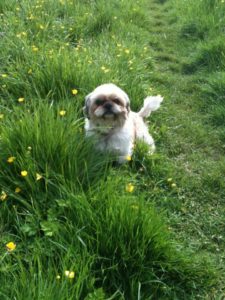With many of us having direct or indirect experience of cancer it can be very easy to apply what we know to our pets. Chemotherapy in our pets is actually very different. As we are making this choice on their behalf we use much lower and well tolerated doses. The aim of veterinary chemotherapy is always ‘palliative’ with the priority being quality of life and to hopefully extend survival time. For some cancers this may mean months, for others a state of ‘remission’ can be entered and they may remain clinically well for years. The decision to put your pet through chemotherapy is of course very personal and dependent on the individual patient; a decision we will help you make and support you in.
We carry out the chemotherapy protocols ourselves at Hollybank. These protocols vary significantly but involve both oral and intravenous drugs. If required, we can also seek specialist support and advice from Ian Grant who runs a chemotherapy consultancy. We currently have a number of patients doing very well with chemotherapy and they all deserve some brave pet recognition.
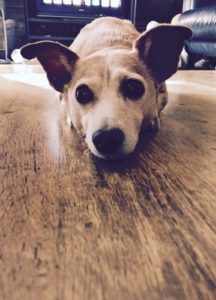 Betty! Betty is a lovely Jack Russel Terrier who loves nothing better than chasing frogs! She was diagnosed with lymphoma in February 2017. Lymphoma is a cancer of white blood cells called lymphocytes. Fortunately, it can be very chemotherapy responsive and for relatively little intervention we can, in cases, significantly extend survival time. There are lots of different drug protocols and Betty is receiving a continuous protocol which means she will continue this ongoing.
Betty! Betty is a lovely Jack Russel Terrier who loves nothing better than chasing frogs! She was diagnosed with lymphoma in February 2017. Lymphoma is a cancer of white blood cells called lymphocytes. Fortunately, it can be very chemotherapy responsive and for relatively little intervention we can, in cases, significantly extend survival time. There are lots of different drug protocols and Betty is receiving a continuous protocol which means she will continue this ongoing.
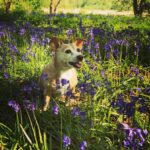 Betty is currently in remission and comes in to have chemotherapy every 4 weeks. In the early stages we had to fine tune the doses of the drugs she was receiving in order for her chemotherapy to be tolerated and therefore worthwhile for Betty. It is imperative that our patients stay well and happy during their chemotherapy. We love seeing Betty and her dedicated owner and Betty is very used to coming to stay with us now.
Betty is currently in remission and comes in to have chemotherapy every 4 weeks. In the early stages we had to fine tune the doses of the drugs she was receiving in order for her chemotherapy to be tolerated and therefore worthwhile for Betty. It is imperative that our patients stay well and happy during their chemotherapy. We love seeing Betty and her dedicated owner and Betty is very used to coming to stay with us now.
Stinky! Stinky is a beautiful black cat. He also has lymphoma, his is classified as a large B cell lymphoma. There are a number of different types in cats and although knowing the type doesn’t always change the chemotherapy, it can sometimes affect the prognosis. Stinky was diagnosed in April 2017 and is receiving the same continuous protocol as Betty. He currently has his chemotherapy every 3 weeks; the longer the patient remains in remission the less frequent the chemotherapy can become. His owner noticed a huge improvement in Stinky very quickly and after initially being a monkey for his tablets at home he is doing very well. The photos are all of Stinky since starting his chemotherapy; aside from his various clip patches you wouldn’t be able to tell any difference, he is enjoying normal life and being mischevious!
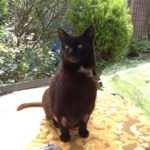
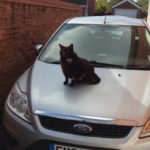
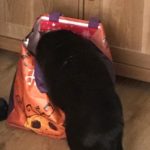
Swift! Swift is a lovely gentle Lurcher. He was diagnosed with lymphoma in March 2017 and started his chemotherapy soon after. He is in fact one of our most well behaved and relaxed patients for his chemotherapy. He is on a different protocol to Betty and Stinky which contains an additional drug; it is more intensive to begin with, however it holds the benefit of being a one off 25 week protocol without the need for continuous chemotherapy. Response rates and survival times are generally better for this protocol however the protocol intensity is based on what we think is best for the individual patient. Swift’s protocol went very smoothly.
We repeat bloods prior to every chemotherapy dose as the drugs have the potential to cause immune suppression. It is therefore important to ensure the next dose is going to be safe and tolerated. For Swift, the occasional dose was delayed due to low white blood cells, however he was never unwell during this time and came back to carry on his regime within a few days. Swift has finished his protocol and is currently in remission with no ongoing trips to the vets. His owners report that he is in really good form at home and even putting some weight on, which he has always struggled with. It was an absolute pleasure to treat Swift and we hope he continues to be a happy and healthy boy for some time.
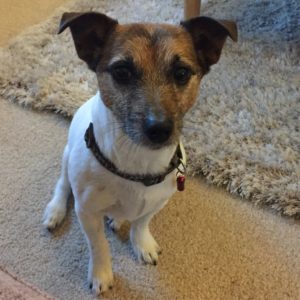 Ernie! Ernie presented back in May 2014 due to rectal prolapse. Despite symptomatic treatment the prolapse was recurrent with no obvious cause. Ernie was referred for further investigations. The referral centre found an enlarged abdominal lymph node but no other abnormalities. The lymph node was sampled and a diagnosis of lymphoma was confirmed. In light of this, Ernie’s recurrent episodes of rectal prolapse were thought to be due to rectal lymphoma. This is an unusual presentation but nonetheless should still be responsive to chemotherapy. Ernie went through a set cycle of chemotherapy similar to Swift and he too was confirmed to be in remission. Ernie has shown an extended and remarkable response to his chemotherapy with no signs of recurrence 3 years on. We miss seeing Ernie’s bouncy self but it is far better that he now only needs to come and visit for boosters.
Ernie! Ernie presented back in May 2014 due to rectal prolapse. Despite symptomatic treatment the prolapse was recurrent with no obvious cause. Ernie was referred for further investigations. The referral centre found an enlarged abdominal lymph node but no other abnormalities. The lymph node was sampled and a diagnosis of lymphoma was confirmed. In light of this, Ernie’s recurrent episodes of rectal prolapse were thought to be due to rectal lymphoma. This is an unusual presentation but nonetheless should still be responsive to chemotherapy. Ernie went through a set cycle of chemotherapy similar to Swift and he too was confirmed to be in remission. Ernie has shown an extended and remarkable response to his chemotherapy with no signs of recurrence 3 years on. We miss seeing Ernie’s bouncy self but it is far better that he now only needs to come and visit for boosters.
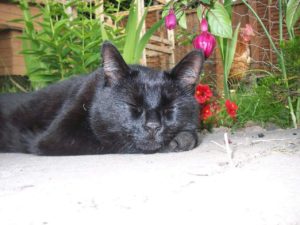 Bingo! Our extra special brave pet this month is Bingo. Bingo was a beautiful brave boy owned by Cat, one of our veterinary nurses at Hollybank. He was diagnosed with lymphoma in September this year following recurrent and non-responsive gastrointestinal signs. Bingo definitely put Cat’s veterinary nurse instincts and care to the test over the years with many misdemeanours and adventures! At 9 years old he fractured his leg and required a number of surgical implants to fix it. He did very well after this but in the following years he suffered with arthritis in this leg and both of his hips. In March of this year the arthritis in his right hip could not be managed with pain medications and we performed a femoral head and neck excision, this would fuse the joint and reduce the pain. This surgery made a big difference to Bingo’s comfort however Cat noticed he was starting to lose weight. His recent bloods had been very normal so we checked his thyroid hormone which confirmed hyperthyroidism. Cat decided to take Bingo to the hyperthyroid cat centre for Iodine therapy, this is the treatment of choice for this condition. Despite a weeks stay at the hyperthyroid centre Bingo came home happy and the procedure proved effective.
Bingo! Our extra special brave pet this month is Bingo. Bingo was a beautiful brave boy owned by Cat, one of our veterinary nurses at Hollybank. He was diagnosed with lymphoma in September this year following recurrent and non-responsive gastrointestinal signs. Bingo definitely put Cat’s veterinary nurse instincts and care to the test over the years with many misdemeanours and adventures! At 9 years old he fractured his leg and required a number of surgical implants to fix it. He did very well after this but in the following years he suffered with arthritis in this leg and both of his hips. In March of this year the arthritis in his right hip could not be managed with pain medications and we performed a femoral head and neck excision, this would fuse the joint and reduce the pain. This surgery made a big difference to Bingo’s comfort however Cat noticed he was starting to lose weight. His recent bloods had been very normal so we checked his thyroid hormone which confirmed hyperthyroidism. Cat decided to take Bingo to the hyperthyroid cat centre for Iodine therapy, this is the treatment of choice for this condition. Despite a weeks stay at the hyperthyroid centre Bingo came home happy and the procedure proved effective.
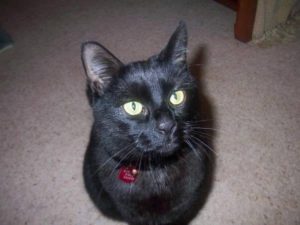 At every turn, Cat has provided Bingo with the best level of care and at his most recent diagnosis opted to try chemotherapy. Response to chemotherapy is monitored by resolution of the pet’s clinical signs and reduction in size of associated tumours and lymph nodes. For Bingo, the response to chemotherapy wan’t as quick as it had been for some patients and he remained miserable and unwell. During all of Bingo’s adventures he had stayed is happy and loving self but this time round Bingo was struggling and Cat made the extremely difficult decision to say goodbye. It is so important to recognise that chemotherapy isn’t always right for every individual and although we miss Bingo dearly it was the right decision for him.
At every turn, Cat has provided Bingo with the best level of care and at his most recent diagnosis opted to try chemotherapy. Response to chemotherapy is monitored by resolution of the pet’s clinical signs and reduction in size of associated tumours and lymph nodes. For Bingo, the response to chemotherapy wan’t as quick as it had been for some patients and he remained miserable and unwell. During all of Bingo’s adventures he had stayed is happy and loving self but this time round Bingo was struggling and Cat made the extremely difficult decision to say goodbye. It is so important to recognise that chemotherapy isn’t always right for every individual and although we miss Bingo dearly it was the right decision for him.
Without treatment, the survival time for Lymphoma is estimated between 4-6 weeks. For many of of our brave lymphoma pets and their owners they have been fortunate enough to have successful chemotherapy and extra time together already which is what makes chemotherapy for this disease worth trying.
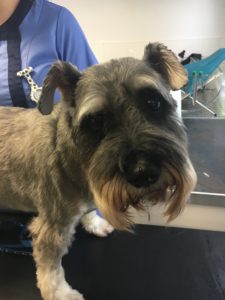 Alfie! Alfie is such a gentleman, always so well mannered and well behaved during his visits with us. Alfie was diagnosed with a skin tumour in January 2017. It was removed surgically and confirmed to be a mast cell tumour. Unfortunately, these have the potential to behave aggressively and the skin tumour recurred in three different places close to the original site. We could of course remove them surgically again, however mast cell tumours release Histamine which can result in poor wound healing. With recurrence once already and the likelihood these were aggressive forms they were deemed ‘non surgical’.
Alfie! Alfie is such a gentleman, always so well mannered and well behaved during his visits with us. Alfie was diagnosed with a skin tumour in January 2017. It was removed surgically and confirmed to be a mast cell tumour. Unfortunately, these have the potential to behave aggressively and the skin tumour recurred in three different places close to the original site. We could of course remove them surgically again, however mast cell tumours release Histamine which can result in poor wound healing. With recurrence once already and the likelihood these were aggressive forms they were deemed ‘non surgical’.
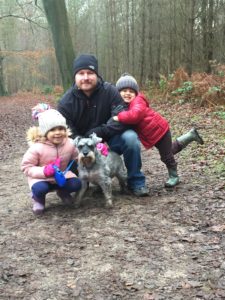
As a result, Alfie embarked on chemotherapy. There are a number of targeted therapies for mast cell tumours but unfortunately Alfie did not show a good enough response to these. Ian Grant, an oncology specialist has been involved in Alfie’s case and with his support we opted to put Alfie on a different chemotherapy protocol which he is currently stable and doing well with. We see Alfie every 1-2 weeks; sometimes for an intravenous drug given via a catheter and other weeks just for a big plate of food with his oral chemotherapy hidden in! Despite Alfie’s challenging disease he has remained very well throughout his chemotherapy and still enjoys life as normal with his lovely family.
Bertie! Bertie is a handsome Labrador Retriever who was found to be bleeding from a mass in his spleen. This would require surgical removal of the entire spleen and further testing on the mass. Bertie did very well with the surgery but unfortunately the mass in the spleen was diagnosed as a malignant tumour, a haemagiosarcoma. Sadly, case studies have shown that the tumour is highly likely to have spread by the time of first presentation and diagnosis. Removal of the bleeding tumour is life saving in itself and removal of the primary tumour helps. However, due to the high risk of spread, oral chemotherapy is required to extend survival time as best as we can. Given Bertie was otherwise so happy and well at home his owner decided to go down this route. Bertie is on an oral chemotherapy drug at home and will continue to take this ongoing. The drug has the potential to cause inflammation in the bladder so his urine is regularly tested for the presence of blood-his dedicated owner actually does this bit! Bertie’s spleen was removed in March 2017 and he still doing very well, he too is none the wiser that he is on chemotherapy!
We hope an insight in to chemotherapy has been interesting and we would like to thank all of our featured pets and clients for letting us share their stories.
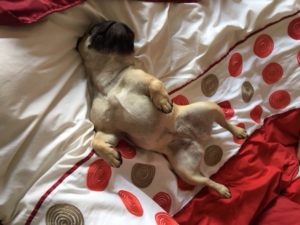 Roxy is an 18 month little French Bulldog who just loves life and people. We have seen Roxy since a puppy and at an early age noted a heart murmur.
Roxy is an 18 month little French Bulldog who just loves life and people. We have seen Roxy since a puppy and at an early age noted a heart murmur. In between Roxy’s annual booster appointments her heart murmur had become louder in nature. Although Roxy was as lively and happy as ever, it was due to this progression that we decided to investigate further.
In between Roxy’s annual booster appointments her heart murmur had become louder in nature. Although Roxy was as lively and happy as ever, it was due to this progression that we decided to investigate further. Roxy’s pulmonic stenosis was characterised as ‘borderline severe’. In such cases, a procedure called balloon valvuloplasty is recommended. This involves the placement of a special catheter into the heart. The catheter has the ability to be inflated to create a rounded balloon type swelling. This region of the catheter is positioned in the abnormal valve so that when inflated it acts to burst open the abnormal valve and reverse some of the stenosis. Despite a non-invasive technique it is not without it’s risks and her owner’s had a big decision to make. They elected to go for the surgery.
Roxy’s pulmonic stenosis was characterised as ‘borderline severe’. In such cases, a procedure called balloon valvuloplasty is recommended. This involves the placement of a special catheter into the heart. The catheter has the ability to be inflated to create a rounded balloon type swelling. This region of the catheter is positioned in the abnormal valve so that when inflated it acts to burst open the abnormal valve and reverse some of the stenosis. Despite a non-invasive technique it is not without it’s risks and her owner’s had a big decision to make. They elected to go for the surgery.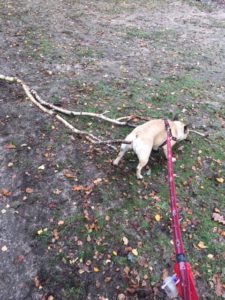 Despite some small changes on her heart scan Roxy’s condition is now characterised as ‘mild pulmonic stenosis’ which is brilliant news! This means her risk associated with this condition has markedly decreased. She will still require some tablets to help provide her with the best long term outcome but Roxy takes these absolutely fine.
Despite some small changes on her heart scan Roxy’s condition is now characterised as ‘mild pulmonic stenosis’ which is brilliant news! This means her risk associated with this condition has markedly decreased. She will still require some tablets to help provide her with the best long term outcome but Roxy takes these absolutely fine.
